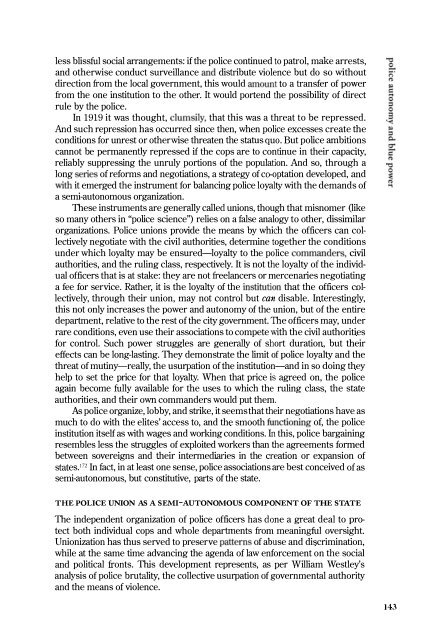Kristian Williams - Our Enemies in Blue - Police and Power in America
Kristian Williams - Our Enemies in Blue - Police and Power in America
Kristian Williams - Our Enemies in Blue - Police and Power in America
You also want an ePaper? Increase the reach of your titles
YUMPU automatically turns print PDFs into web optimized ePapers that Google loves.
less blissful social arrangements: if the police cont<strong>in</strong>ued to patrol, make arrests,<strong>and</strong> otherwise conduct surveillance <strong>and</strong> distribute violence but do so withoutdirection from the local government, this would amount to a transfer of powerfrom the one <strong>in</strong>stitution to the other. It would portend the possibility of directrule by the police.In 1919 it was thought, clumsily, that this was a threat to be repressed.And such repression has occurred s<strong>in</strong>ce then, when police excesses create theconditions for unrest or otherwise threaten the status quo. But police ambitionscannot be permanently repressed if the cops are to cont<strong>in</strong>ue <strong>in</strong> their capacity,reliably suppress<strong>in</strong>g the unruly portions of the population. And so, through along series of reforms <strong>and</strong> negotiations, a strategy of co-optation developed, <strong>and</strong>with it emerged the <strong>in</strong>strument for balanc<strong>in</strong>g police loyalty with the dem<strong>and</strong>s ofa semi-autonomous organization.These <strong>in</strong>struments are generally called unions, though that misnomer (likeso many others <strong>in</strong> "police science") relies on a false analogy to other, dissimilarorganizations. <strong>Police</strong> unions provide the means by which the officers can collectivelynegotiate with the civil authorities, determ<strong>in</strong>e together the conditionsunder which loyalty may be ensured-loyalty to the police comm<strong>and</strong>ers, civilauthorities, <strong>and</strong> the rul<strong>in</strong>g class, respectively. It is not the loyalty of the <strong>in</strong>dividualofficers that is at stake: they are not freelancers or mercenaries negotiat<strong>in</strong>ga fee for service. Rather, it is the loyalty of the <strong>in</strong>stitution that the officers collectively,through their union, may not control but can disable. Interest<strong>in</strong>gly,this not only <strong>in</strong>creases the power <strong>and</strong> autonomy of the union, but of the entiredepartment, relative to the rest of the city government. The officers may, underrare conditions, even use their associations to compete with the civil authoritiesfor control. Such power struggles are generally of short duration, but theireffects can be long-last<strong>in</strong>g. They demonstrate the limit of police loyalty <strong>and</strong> thethreat of mut<strong>in</strong>y-really, the usurpation of the <strong>in</strong>stitution-<strong>and</strong> <strong>in</strong> so do<strong>in</strong>g theyhelp to set the price for that loyalty. When that price is agreed on, the policeaga<strong>in</strong> become fully available for the uses to which the rul<strong>in</strong>g class, the stateauthorities, <strong>and</strong> their own comm<strong>and</strong>ers would put them.As police organize, lobby, <strong>and</strong> strike, it seems that their negotiations have asmuch to do with the elites' access to, <strong>and</strong> the smooth function<strong>in</strong>g of, the police<strong>in</strong>stitution itself as with wages <strong>and</strong> work<strong>in</strong>g conditions. In this, police barga<strong>in</strong><strong>in</strong>gresembles less the struggles of exploited workers than the agreements formedbetween sovereigns <strong>and</strong> their <strong>in</strong>termediaries <strong>in</strong> the creation or expansion ofstates.172 In fact, <strong>in</strong> at least one sense, police associations are best conceived of assemi-autonomous, but constitutive, parts of the state.THE POLICE UNION AS A SEMI-AUTONOMOUS COMPONENT OF THE STATEThe <strong>in</strong>dependent organization of police officers has done a great deal to protectboth <strong>in</strong>dividual cops <strong>and</strong> whole departments from mean<strong>in</strong>gful oversight.Unionization has thus served to preserve patterns of abuse <strong>and</strong> discrim<strong>in</strong>ation,while at the same time advanc<strong>in</strong>g the agenda of law enforcement on the social<strong>and</strong> political fronts. This development represents, as per William Westley'sanalysis of police brutality, the collective usurpation of governmental authority<strong>and</strong> the means of violence.143


